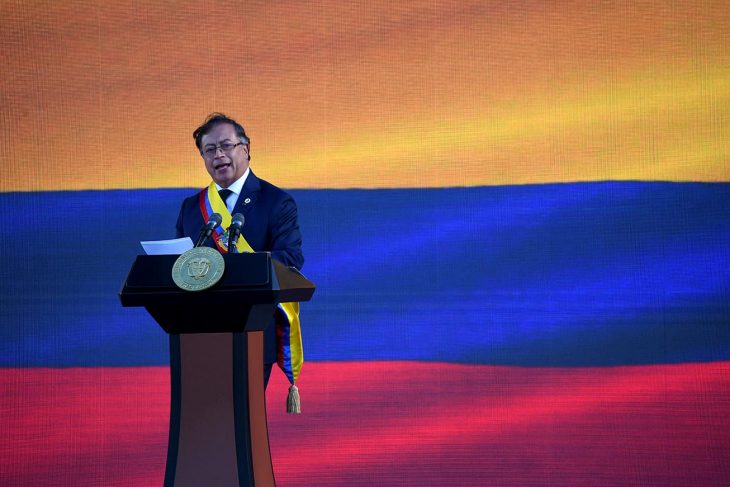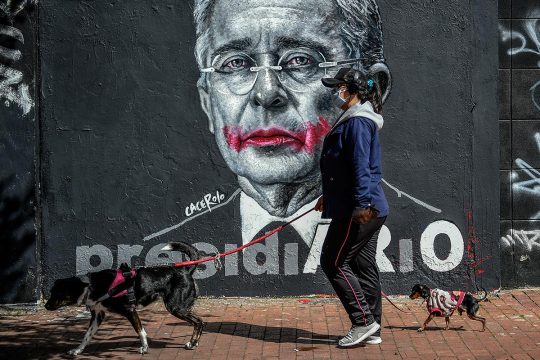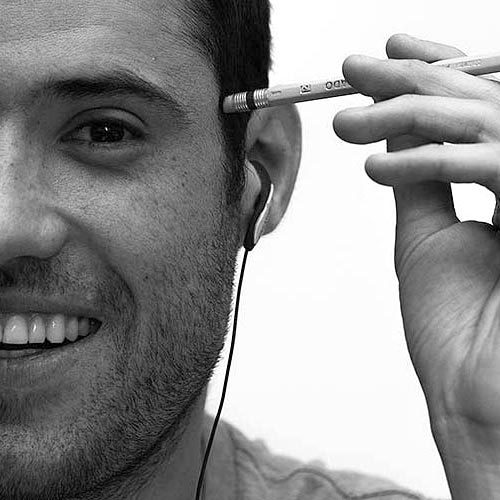Since coming to power in August, President Gustavo Petro announced an ambitious policy of "total peace" for Colombia. Not only did he start bringing the Truth and Reconciliation Commission's final report to schools across the country and promised to give a new impetus to implementation of the landmark 2016 peace agreement with the Revolutionary Armed Forces of Colombia (FARC) that his predecessor Iván Duque always tried to belittle. Petro went a step further, promising to seek the definitive closure of the internal armed conflict in a country where, despite the demobilization of 13,000 former FARC guerrillas, a handful of illegal armed groups and organized crime groups still roam around.
In two months, he already begun preliminary talks with the National Liberation Army (ELN) guerrilla in Havana and has held exploratory meetings with dissident sectors of the FARC that did not join the 2016 peace deal or did so but later took up arms again. It has also opened the door to doing so with various organized crime groups such as the so-called Gulf Clan.
However, Petro has offered little clarity on what type of negotiation he will conduct with each of these groups and what criminal justice logic he will apply to them to achieve their demobilization. This means there are many questions about how he will satisfy the rights of victims, as well as whether these other guerrillas and criminal organisations will come under the transitional justice system that has been in place since 2016 or create new mechanisms for them.
These questions will be key to the future of the Special Jurisdiction for Peace (JEP), the judicial arm of this transitional justice, which five years after opening its doors is close to announcing its first sanctions in two cases and to announcing an indictment in a third one, but still has years of investigations ahead and a new batch of macro-cases just beginning.
Transitional justice by chapters
The new president's announcement to seek a negotiated peace is not unique, but fits within a mould of closing the armed conflict by chapters. In the early 1990s, the Colombian government signed peace agreements with five guerrilla groups, including the M-19 in which Gustavo Petro himself was a militant for over a decade. Then, at the beginning of the 21st century, it demobilized the paramilitary groups gathered in the United Self-Defense Forces of Colombia (AUC). And, more recently, it did so with the FARC, the largest rebel group of all.
In the midst of the Duque administration’s inability to exert control over the geographic areas left by the FARC and the absence of a comprehensive security policy, several of the existing groups - from the ELN to residual FARC and paramilitary groups - have been expanding in territorial control and increasing their share in illicit trades such as drug trafficking or gold mining. The deterioration in security conditions has been so marked that the UN just said that Colombia is experiencing its worst peak of confinements in a decade, the homicide rate increased during the last government and the International Committee of the Red Cross (ICRC) speaks of six different armed conflicts in the country.
In this scenario, Petro's idea of returning to the 2016 peace agreement as a road map, with its public policy chapters designed to put an end to the conditions that allowed the recycling of violence, makes sense. Less clear is his vision of how to negotiate with the groups that remain in arms.
Armed groups with criminal or political ends
Although in practice states have a wide margin to decide with whom they engage in dialogue, Petro has two possible routes.
One is negotiation, which has historically been reserved for politically motivated groups with whom the government may end up reaching deals on specific public policies. This is what the Santos government achieved with FARC, with whom - in addition to disarmament, reincorporation and a transitional justice system with which they are now accountable – he agreed upon an agenda of measures on rural development, political participation and drug policy.
The other is submission to the ordinary criminal justice system, which in Colombia has been reserved for those criminal groups whose objective has been more linked to controlling illicit economies than to political ends.
As the line between the two motivations is sometimes porous, it becomes even more important to characterise them. In addition to the more classic questions of international humanitarian law about the group's level of organization and hostility, such as its ability to wage military operations or its command structure, there is also a more subjective variable linked to their purpose: is it a group that seeks to enrich itself and set up an armed apparatus to maintain a racket, or is it a group whose objective is political and engages in illicit activities to finance it?
Although many groups combine these means and ends, in general, the greater their political purpose or the more hostile and organized they are, the more legitimacy governments have to seek negotiation.
Past Colombian governments have so far classified the ELN as a party to the conflict, but none have done so for negotiation purposes with the organized crime groups, known locally as ‘criminal gangs’, many of which emerged from paramilitary structures that did not disarm and focused on drug trafficking.
Political status for criminal groups and FARC deserters?
So far Gustavo Petro has not detailed what route he would follow beyond vague details about talks with the ELN. At the beginning of October, he announced that he would start negotiations with that guerrilla group at the point where they left off with the Santos government, with whom they had reached a framework agreement that defined an agenda but on which they were unable to advance.
In three months of the new administration, several other groups have expressed interest in joining Petro's “total peace”. ‘Otoniel’, the Gulf Clan’s kingpin who was extradited to the United States in May this year, wrote a letter to Petro in August asking him to continue discussions about such a negotiation. Two weeks ago, the Second Marquetalia - the FARC dissident group led by its former chief negotiator 'Ivan Marquez' - issued a statement indicating its desire to join. Almost at the same time, another former FARC dissident group called Frontier Commandoes followed suit in a video.
Until a month ago, Colombian law only allowed Petro to negotiate with illegal armed groups as long as they were parties to the conflict. Two weeks ago, Congress approved a law led by the governing party that allows him to do so also with criminal groups, instead of having to submit them to the ordinary justice system.
That public order law is the fundamental legal tool that establishes clear rules for any talks with armed groups. One of the changes introduced by the government in extending it was to include what it termed ‘high impact organized crime structures’. Although Petro's party is seeking to push through another law detailing how submissions with these could work, including plea bargains, in practice it removed any distinction between a party to the conflict and an organized crime group.
Another thorny question arises with whether the government could open a re-negotiation with former FARC deserters and give them political status just a few years after they abandoned the peace deal – a decision that made them loose all the legal benefits brought by that peace agreement and become subjects of the ordinary criminal justice. The Petro government has been ambiguous about this option. Although it has not made formal announcements, Interior Minister Alfonso Prada was in favor of including the FARC deserters with the argument that not doing so is tantamount to not achieving total peace in the country. Peace commissioner Danilo Rueda even referred to one of these structures as the “Central High Command of the FARC-EP”, giving them the historical moniker of the now defunct guerrilla group’s leadership.
Potential consequences for the special tribunal
In any of these routes, be it a political negotiation or a deal with the ordinary justice system, one of the central questions is how the demands for truth, justice and redress from victims of these groups will be satisfied.
If it is a negotiation, would they be remitted to any of the existing transitional justice mechanisms, including the system born of the peace deal with FARC that conditions more lenient sanctions to acknowledging responsibility, providing truth and reparations to victims? Does that mean that the JEP’s mandate could be expanded to investigate, judge and sanction them? Would other mechanisms such as Justice and Peace, which worked for more than a decade for the former paramilitaries, be extended? Or would an entirely new one be created and, if so, would it maintain the same formula of the JEP or bring a different standard? And if it is a submission to justice, what commitments would they have to make to their victims in order to receive any criminal justice benefits?
Amid the vagueness, one thing seems certain: whatever decision the government makes will have implications for the current process. Any of these mechanisms could end up competing with the JEP not only for limited economic and human resources, but also for public attention and the capacity to generate symbolic milestones of justice for the atrocities of a half-century conflict that has left 9.3 million victims.
In fact, after five years of investigation by that tribunal, this year Colombians were able to see one of the biggest promises of the peace agreement fulfilled. In a series of hearings, a dozen former FARC commanders and a score of military officials asked victims for their forgiveness and owned up their responsibility as those most responsible for such emblematic crimes as kidnappings and the extrajudicial executions locally known as 'false positives'. Incidentally, most of them accepted the accusations levelled against them by the JEP of having committed war crimes and crimes against humanity. Following this progress, the first sanctions should begin to be issued in the coming months.
In at least one more case, that of crimes committed in the Pacific region of Nariño, the JEP is very close to unveiling its first indictment against FARC members, including how they selectively targeted ethnic populations such as the indigenous Awá and several Afro-descendant communities. In the remaining four macro-cases it opened between 2018 and 2019, including the one on child recruitment and the political extermination of the leftist Patriotic Union party, the delay is notorious and there is no sign from the JEP as to when those first indictments might be announced. In addition, the JEP has also expanded its workload by opening three new cases this year.
Depending on what route Gustavo Petro chooses in his fledgling negotiations, the special tribunal could then face more work or competition.
A new Truth Commission?
This is not the only instance where the Petro government could step over the transitional justice’s shoes. Foreign Affairs Minister Alvaro Leyva, a veteran conservative politician who advised FARC in the Havana talks, opened the door for the negotiations that the new government seeks to advance to also close with a truth commission - despite the fact that the 2016 peace accords’ Truth and Reconciliation Commission’s (TRC) mandate just ended in August after three and a half years of work and a 10,000-page final report.
Although the Petro government's secrecy about the methodology and agenda of negotiations that have not yet begun is understandable, many of these inevitable questions – such as whether the existing transitional justice system might be trivialized if it is overloaded or if a new TRC is created just after another one closed - have arisen from the eagerness of its officials and him to announce “total peace” with great fanfare.
In contrast, the Santos government only unveiled its peace negotiation with FARC after two years of secret dialogues had passed and led to a framework agreement with a concrete six-item agenda and six ground rules. That rigorous process design is precisely what Foreign Minister Leyva, one of those responsible for Petro's peace policy, scoffed at, comparing it to a rigid classical music score while he preferred jazz-like improvisation. “We’ll create it as we go along,” he said.








